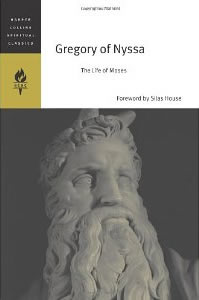Book Notes
 Gregory of Nyssa, The Life of Moses, translation, introduction, and notes by Abraham J. Malherbe and Everett Ferguson (New York: Paulist Press, 1978), 208pp.
Gregory of Nyssa, The Life of Moses, translation, introduction, and notes by Abraham J. Malherbe and Everett Ferguson (New York: Paulist Press, 1978), 208pp.
Born soon after emperor Constantine embraced Christianity, Saint Gregory of Nyssa (335–395) was a church bishop and leading intellectual who guided the faith in its change of circumstances. Instead of enduring persecutions, Christianity was a state religion that enjoyed imperial privileges. Instead of flourishing among socio-economically marginal people as it had at its beginning, the gospel needed to engage the cultural elite of the day. Gregory led the way. He was the third of ten children born into a wealthy and influential Christian family. He entered his brother Basil's monastery, and then under Basil's influence became bishop of Nyssa when he was about thirty-five.
Gregory exemplifies the efforts made by Christian intellectuals to make the Jewish and Christian scriptures palatable to Hellenistic culture, which otherwise found them repugnant and unintelligible—"to the Greeks foolishness." His Life of Moses, composed just a few years before he died, represents his mature work and illustrates his synthesis of pagan and Christian thought. In addition to a brief introduction and conclusion, his text of about a hundred pages falls into two distinct sections. The first section is a historia (a "bare history") which summarizes the story of Moses as it is literally told. The second part is a theoria or contemplation of the spiritual meaning of the literal text.
As part of the Alexandrian school of thought, Gregory epitomizes the allegorical interpretation of the Bible. For Gregory, the literal-historical text signifies something different and deeper, so he seeks to "harmonize" the two and arrive at a "a spiritual interpretation of the things spoken literally." The "loftier meaning" is more important than the "obvious one." Gregory describes this "double meaning" as typological, moral, spiritual, figurative, deeper, inner, hidden, and higher. So, for example, the crossing of the Red Sea signals baptism, and the manna from heaven evokes a discourse on the incarnation. This allegorical method held sway in much of the church for a thousand years, although reading it today feels very strange.
Gregory's Life of Moses also illustrates his sophisticated philosophical theology, indebted to Platonism, albeit with a pronounced ambivalence toward pagan learning. Gregory acknowledges "the riches of reason," and affirms that "there are certain things derived from profane education which should not be rejected," even though pagan learning is "always in labor but never giving birth." Truth, writes Gregory, is "the sure apprehension of real Being. So, whoever applies himself in quietness to higher philosophical matters over a long period of time will barely apprehend what true Being is, that is, what possesses existence in its own nature, and what nonbeing is, that is, what is existence only in appearance, with no self-subsisting nature." Over fifty pages of footnotes elucidate the philosophical, theological, historical, and linguistic nuances of Gregory's thought.
Gregory's allegorical interpretation and philosophical theology make for difficult reading. But there are other interesting and practical themes, including the central importance that he gives to free will, his idea that our spiritual progress is never finished but is eternal (Gregory quotes Philippians 3:13), the universal return of all things to God, and the infinite and unlimited nature of God. With no stopping place in the spiritual quest for perfection, our journey has no limit. But even though perfection is unattainable and impossible, Gregory encourages us that "by attaining even a part we gain a great deal."


